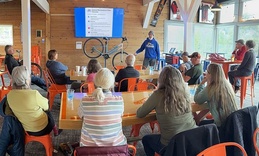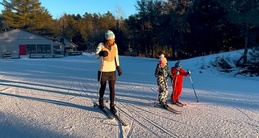
Straight Outta Hamtramck
Cedar Shop a Paean to All Things Polish
By Ross Boissoneau | Oct. 17, 2020
There it stands, in downtown Cedar: The Polish Art Center. Some paintings of the Old Country probably, maybe some Polish pottery. Likely some Polish-made jewelry as well. How appropriate, right in the middle of a town that — until this strange summer, of course — celebrates its Polish heritage every July with one of the North’s biggest Polska celebrations, Cedar Polka Fest.
If that’s what you think, you’re in for a surprise. A few of them, actually.
WITAMY (WELCOME)
First, there’s quite a bit more than paintings and pottery. Second, the proprietors weren’t thinking about Cedar’s reputation when they elected to move Up North. In fact, they’d never even heard of the town or its Polish heritage.
Start with the center’s contents. It’s easy to experience sensory overload as soon as you walk in. White paper cones on strings dangle from the ceiling throughout the store. Bright, colorful pottery lines the shelves. Jewelry, T-shirts, drinking glasses, story books, tiny lambs made of sugar, even “I Love Polska” folk art decorative facial tissues — on and on it goes, the shop at 8994 S Kasson St. nearly bursting at the seams.
And here’s the voice of Kathleen Bittner-Koch: “Have you been here before?”
“No,” I respond. (I’d certainly have remembered — and been prepared for the visual onslaught.)
The Polish Art Center is — quite obviously — far more than art. The Polish Emporium might be a better name, as it’s a celebration of all things Polish, from its art, music, décor, and apparel to imported food delicacies, vegetable seeds, and a freezer stuffed full of pierogis and meat from Bittner-Koch’s nearby Polish Heritage Farm. Which is what brought them to Cedar in the first place.
HISTORIA (HISTORY)
Bittner-Koch and her husband, Thomas Koch, moved north after becoming dissatisfied with urban farming in the Detroit area. She went on Craigslist and found a farm for sale outside Cedar. At the time, she says she had no clue regarding the town’s Polish heritage and no intention of opening a store. Instead the couple concentrated on establishing their family farm, where they raise “Leelanau’s finest Mangalitsa,” the hairy breed of fine hogs Modern Farmer dubbed “the Kobe beef of pork.”
Two and a half years into the farming operation, a space opened up in downtown Cedar. By this time the family was familiar with the town’s Polish culture, and Bittner-Koch saw an opportunity, so she persuaded a downstate retailer she knew well that opening a Polish Art Center in Cedar would be a good idea.
Those retailers: Ray and Joan Bittner, her parents — and also owners of the original Polish Art Center, in Hamtramck. They had bought the iconic cultural center from its founder, Polish immigrant Joseph Kalenkiewicz, in 1973. Bittner-Koch said she and her sister, Michelle, had grown up in their parents’ store; it simply made sense to her to open another location in the heart of Northern Michigan’s Polish epicenter.
According to Bittner-Koch, the original is at least three — no, make it four — times the size of her Cedar store, somewhat incredible to imagine when you look around at her vast inventory of goods, so much of which comes with unique and intriguing stories.
DOBRA (THE WARES)
Take the amber jewelry, for example. Bittner-Koch explained that the amber comes from the Baltic area, as a result of prehistoric pine forests being decimated by volcanic activity.
“The highest quality amber comes from Poland, Lithuania, and Ukraine. Each is unique,” she said, explaining how Polish amber is often polished and set off by silver, while Lithuanians favor diamonds, and Ukraine and Russian jewelers use it raw.
She also launches into a treatise on the medicinal properties of amber. It has long been a staple of various folk and homeopathic remedies for its purported healing properties.
“Succinite is anti-inflammatory,” she said of the main component in amber. “The body will absorb it.” It’s been used as a natural antibiotic, to relieve stress and anxiety, to protect cells from degeneration and organism from illnesses and premature aging and as a fast-acting natural antioxidant.
Some of the most eye-catching items are the Pisanka, or decorated eggs. Brilliant, jeweled colors and intricate patterns are made using wax and dyes. Those struck by the elaborate patterns and brilliant colors and interested in making their own might be in luck if the pandemic eases: Bittner-Koch usually teaches classes on decorating the eggs each spring.
ODWIEDZIC (VISIT)
The amber and eggs are just the proverbial tip of the iceberg. Besides those beauties and the stocked freezer; and the hats, scarves, and footwear; and the cookies, candies, flags, patches, books, dolls — well, the list goes on and on. Just like the store. And according to Bittner-Koch, there’s so much more where that all came from: “We get all our stock from Hamtramck,” said Bittner-Koch.
While their parents are still intimately involved in the Hamtramck store, Michelle runs that location while Kathleen oversees the shop in Cedar. “Now what we did for fun, we do for a living,” Bittner-Koch said. The two sisters are also the amber buyers. The multitude of paper cones, a.k.a. winter bells, are in large part Michelle’s handiwork, and they are available to purchase, either pre-made or in kits.
The Polish Art Center in Cedar, just 20 minutes from Traverse City, is open Monday and Saturdays 10am–5pm and Sundays noon to 4pm. You can shop its plentiful goods (and those of the Hamtramck location) at PolArtCenter.com, but to really get the impact, you'll want to visit in person. (231) 835-2242
Trending

Building the Life You Want
Who needs a life coach? While people seek out life coaches for a variety of reasons, one theme is almost always present, co… Read More >>
Retired Recess Back in Session
Mt. Holiday in Traverse City is calling all “older kids” (50+) to Retired Recess! Held every Thursday from noon-… Read More >>
One, Two, Punch! at Significant Strikes
Significant Strikes in Traverse City is starting the year off with a high kick. Three of their most popular classes—Bo… Read More >>


